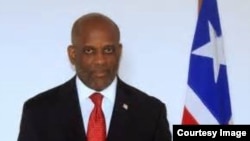Liberia’s next presidential election is in 2017, but candidates are already lining up to succeed Africa’s first female elected president, Ellen Johnson Sirleaf, and hopefully dethrone the ruling Unity Party.
Vice President Joseph Boakai has already said he will run in 2017 after being petitioned by citizens from his Lofa County region.
Another candidate is Charles Brumskine of the opposition Liberty Party, who ran in the 2005 and 2011 presidential elections and lost. He said he failed because he did not effectively communicate his vision for the country.
This time around Brumskine said he is running to bring about reconciliation, reform, rebuilding and recovery.
He said he and other opposition candidates should come together to stop what he called the “hegemony” of the ruling Unity Party from wining its third consecutive presidential election.
Has 'a vision'
“I am running because we do have a vision to lead our country and a commitment to serve our people. Our vision is based on what we call the 4Rs – reconciliation, reform, rebuild, and recovery," Brumskine said.
"These are the four pillars of our platform that will take us into the next stage that Liberia should be in for its development,” he added.
Brumskine took responsibility for why his party did not do well in the last two presidential elections.
“As the leader of my party and the candidate myself, I take responsibility for the lack of success in our first two attempts. And I believe it basically had to do with not having communicated effectively our vision for the country of Liberia,” he said.
He said by announcing his candidacy almost a year and a half before the next election, Liberians will know about his party’s platform and gravitate toward the party.
There have been speculations that Brumskine was considering teaming up with Liberian football legend George Weah’s Congress for Democratic Change (CDC) party.
Weah took second place in the last two presidential elections.
Aspirations
Brumskine said he would be willing to let go his own presidential aspiration to join with other opposition parties and come up with a single candidate.
But he said it is a decision that must be made by all parties, and that whoever is chosen as the candidate must be able to win the respect and trust of the Liberian electorate.
“It is our desire to work with every opposition political party and opposition politician to ensure that we together can succeed in 2017," he said.
"The Unity Party has won two consecutive elections. We must make sure they do not win a third election. Otherwise, the opposition in Liberia could crumble and then we will become a one-party state again, something that no one wants,” Brumskine said.
Liberia’s economy is still struggling to rebound almost 11 years after the end of the country’s civil war. It struggles with a high unemployment rate. And the Ebola epidemic has also effectively slowed economic growth.
Brumskine said he will leave it up to Vice President Boakai to defend the record of President Sirleaf’s government, which has been in power nearly 10 years.
Nevertheless, he said the vision and programs of a Brumskine government will be different from the Sirleaf government.
“For example, our philosophy of government, we do not believe that government is the solution for everything. We believe that the private sector is the driving force for growth and development in any economy," Brumskine said.
"We want to make sure that education is dealt with differently by having teachers trained, by creating incentives for qualified people to get into the classrooms for our children and creating a learning environment for them,” he added.
Brumskine said his government’s health policy will focus on the clinical aspect as opposed to what it is today.
Constitutional amendments
Liberians this year began debating amendments to the country’s constitution.
For example, a constitutional convention held in April in central Liberia endorsed an amendment to make Liberia a Christian country.
The delegates approved an amendment limiting terms: presidential office, from six to four years; senators, from nine to six years, and representatives, from six to four years.
They also said the superintendents of the 15 counties or political subdivisions should be elected by the people as opposed to be being appointed by the president.
Brumskine said he supports the de-concentration of power to give the average Liberia a chance to have say in the running of his or her government.
But he said those who support the idea of having superintendents elected by the people should take into consideration the impact it could have on the country’s economy.
“A consideration should be given to whether or not we elect our superintendents because if we were to elect superintendents that would mean the superintendent will not be reporting to the president," he said.
"If you have superintendents elected, you have to have 15 county legislatures to whom the superintendents will have to report. We may not be able to afford that economically, at least for now," he added.
However, Brumskine said decentralization can come about if Liberia reinstates the election of city mayors and tribal chiefs.





